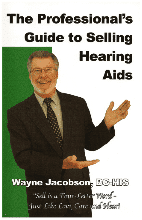By Wayne Jacobson, BC-HIS
Many hearing care professionals really don’t understand what a patient is saying when they say “no.” In the majority of cases, all they are saying is: “Based on what you have told me so far, the answer is no. Tell me more.” After you give the patient more information, they deserve a new opportunity to make a new decision based on the new information.
Giving more information regarding how your recommendation will help the patient is not using pressure. In fact, if the patient did not want you to give them the information, they would not have come to you in the first place. By answering their questions (overcoming their objections), you are merely doing what the patient wanted when they came to see you; you are fulfilling your professional obligation.
One of the best definitions I have heard of “selling” is from Zig Zigler: “Selling is nothing more than finding out what someone wants and then showing them how to get it.” After we find out what the patient really wants and we start showing them how to get it, we actually become “assistant buyers” instead of hearing aid salespeople. We can psychologically move over to their side of the table as we help them figure out what they need and how to get it.
I don’t know about you, but I would much rather buy at the first place I go instead of running all over town, going to two or three or even more places. Sometimes I can be a little stubborn (or so my wife says). Sometimes I will arbitrarily set a limit on what I want to spend (unless the salesperson can give me a persuasive argument to spend more). But the fact remains, I would rather do it only once instead of running all over the place. If I bring up an objection, I actually want it to be answered (overcome) with new information that I did not have when I brought up the objection.
Here is one basic concept that I feel we must understand about our patients: They want to be right and they want to be understood. When we get an objection, the best way to handle it is to: Acknowledge, Agree, and Continue.
The last thing we want to do with a patient is to get into an argument; even if we win the argument, we will lose the sale. If we acknowledge and agree with the objection, it is hard for an argument to start since we are agreeing with what they said. But the key is to “continue” and give them enough new information showing them why they should proceed despite the objection.
A good example is when you present the price of your recommendation to a patient and they say, “That is too much money!” You could say, “Not really when you look at the cost of hearing correction today.” But that could be the start of an argument.
It is much more effective to say, “Yes, that is a lot of money. But in your case, you are active in business, active in your community, and active in your church. You find yourself in noisy environments where communication is essential. You need the directional microphones and advanced noise management that these instruments offer. If you lived a more sedentary lifestyle, you could get by with a lower and less expensive level of technology. But you are vibrant and active and this is what you need.”
We acknowledged and agreed with their objection, but then we continued and showed why they should proceed anyway. There are not many objections that cannot be handled by acknowledging, agreeing, and continuing. It is really difficult for our patients to get mad at us or upset with us when we are agreeing with what they said. As an assistant buyer, they expect you to point out things that they may have not understood or thought of.
Inertia Is Our Enemy
When a patient waits approximately 7 years before looking into hearing correction the first time, it is very easy for them to continue to do nothing. They have 7 years’ worth of inertia built up, and it becomes our responsibility to motivate them enough to break that inertia and get moving toward better hearing. They will often want to go home and “think about it.” If they have been thinking about it for 7 years, what will another day or week help?
The “I want to think about it” objection is probably one of the most frustrating ones we run into. Quite often, this can be overcome before it ever comes up by creating excitement and an urgency in the consultation process. Usually, when a patient wants to think about it, they are just saying that they are not sold yet. Our job is to give them more information and then a new opportunity to make a new decision based on the new information.
If we apply our “acknowledge, agree, and continue” philosophy, it could go something like this: “I agree, this is definitely something to think about. In fact, that is precisely why we have our 30-day evaluation period with all of our instruments. You can wear them for 30 days and visit the people you socialize with, go to the restaurants you go to, and do the things you normally do. You can see firsthand how they perform and you will know what to think about. Instead of thinking, ‘Should I get these or not?’ you can think, ‘Are these doing enough to make them worthwhile?’ You will know what you are actually thinking about. If they are not doing what you want, you can return them and the only cost will be a minor fitting fee. Does that sound fair enough?”
If they say yes, that does sound fair enough, simply proceed with impressions or measuring for the slim tube or RIC wire.
In many cases when the patient says “no,” they are really saying they don’t “know” enough to say yes. Our responsibility is to give them enough information so they do know enough to say “yes” (or, eventually, a well-informed “no”). But if we stop with the first “no,” we are shirking that responsibility; we’re not doing what our patients expected when coming to see us.
Acknowledgement
This article was adapted with permission from a chapter in Wayne Jacobson’s new book, The Professional’s Guide to Selling Hearing Aids, which covers many more scenarios and topics similar to those discussed here. To purchase a copy, contact the author or visit: www.sellinghearingaids.com

|
Wayne Jacobson, BC-HIS, has worked in the hearing aid industry since 1976. He owned and operated a private practice for 22 years, and has been presenting seminars since 1984 on hearing aid fitting, practice development, sales techniques, hearing aid repair and modification, as well as real-ear verification. Since 2008, he has been a Practice Development Consultant with Phonak. CORRESPONDENCE can be addressed to HR or Wayne Jacobson at: [email protected] |





